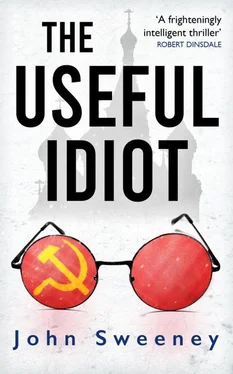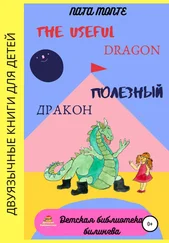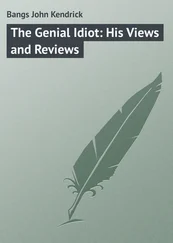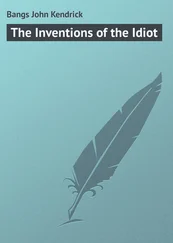John Sweeney - The Useful Idiot
Здесь есть возможность читать онлайн «John Sweeney - The Useful Idiot» весь текст электронной книги совершенно бесплатно (целиком полную версию без сокращений). В некоторых случаях можно слушать аудио, скачать через торрент в формате fb2 и присутствует краткое содержание. Город: London, Год выпуска: 2020, Издательство: Silvertail Books, Жанр: Исторический детектив, Триллер, на английском языке. Описание произведения, (предисловие) а так же отзывы посетителей доступны на портале библиотеки ЛибКат.
- Название:The Useful Idiot
- Автор:
- Издательство:Silvertail Books
- Жанр:
- Год:2020
- Город:London
- ISBN:нет данных
- Рейтинг книги:4 / 5. Голосов: 1
-
Избранное:Добавить в избранное
- Отзывы:
-
Ваша оценка:
- 80
- 1
- 2
- 3
- 4
- 5
The Useful Idiot: краткое содержание, описание и аннотация
Предлагаем к чтению аннотацию, описание, краткое содержание или предисловие (зависит от того, что написал сам автор книги «The Useful Idiot»). Если вы не нашли необходимую информацию о книге — напишите в комментариях, мы постараемся отыскать её.
* * *
The Useful Idiot — читать онлайн бесплатно полную книгу (весь текст) целиком
Ниже представлен текст книги, разбитый по страницам. Система сохранения места последней прочитанной страницы, позволяет с удобством читать онлайн бесплатно книгу «The Useful Idiot», без необходимости каждый раз заново искать на чём Вы остановились. Поставьте закладку, и сможете в любой момент перейти на страницу, на которой закончили чтение.
Интервал:
Закладка:
The formalities did not take long. He had no baggage, none at all. Lyushkov indicated the way to the pedestrian crossing at the side of the railway bridge. Jones started walking and did not look back, not once. He waited until until he was certain he was more than halfway across the border when he started to run.
Somewhere in the middle of nowhere in Poland, he’d got the train guard to stop the train so that he could wire ahead, alerting the free spirits of the Berlin press corps – some still existed in 1933 – to his press conference the next day. When he had finished, he took a short-cut and hurried through the railway station buffet and saw a half-eaten sausage on an abandoned plate. He had not the seen the like of it in six months.
He was moving as fast as humanly possible but it took him a day and a night to cross Poland and enter Germany, the morning to get to the German capital. Arriving around noon, he discovered the old Berlin, the one he loved, had gone. In its stead was a city with Swastikas hanging from the station, from all the grand buildings, with loudspeakers at the street corners playing recordings of Herr Hitler’s speeches again and again. The manager of the Berlin press club, a Herr Schmidt, dapper, fastidious, greeted him fulsomely, too much so, and led him in to the conference room. Behind the dias where he was due to speak hung a Swastika flag.
A bell hop found him and gave him an envelope with his name on it. Recognising Evgenia’s handwriting, he was about to open it when something stopped him.
“Is everything in order, Mr Jones?” asked Herr Scmidt.
Jones placed the envelope in his jacket pocket and gestured at the Swastika.
“Take that away,” said Jones, flatly.
Schmidt thought about it for a few seconds, then nodded, and asked the bellhop to remove the flag.
The journalists started to arrive soon after. Once the room had filled up, Jones began: “In the Soviet Union, right now, as we speak, millions are dying of famine…”
At the end, questions.
The hardest one was asked by no-one he recognised: “Got any collateral for this famine story, Mr Jones? Any still photographs? Any film footage?”
“No, I’m sorry.”
“Why not?”
Silence.
“You’re saying millions are dying, Mr Jones. That’s a big claim. It’s your word against the entire Soviet Union. And you’ve got no photographs or film to back your story up?”
“That turned out not be be possible,” Jones said and his voice cracked, a little.
“But Mr Jones…”
“…there’s nothing more to say,” and he closed the press conference.
When he got to his hotel, he asked for a bottle of sleeping pills. In his room, he closed the curtains, undressed, took Evgenia’s envelope from his jacket and kissed it but did not open it and then took a fistful of pills and studied them in his hand. There were about twenty or so pills in his palm, gleaming dully in the light from the bedside lamp. His hand started to tremble. Then he threw the pills away and they pattered on the parquet floor. Stooping, he picked up only two and swallowed them and sluiced them down with a glass of water and closed his eyes and had his first proper sleep for time out of memory.
In the night he woke to a rustling sound. Someone was pushing a copy of a newspaper underneath the door of his hotel room. He hurried to the door, opened it and saw, just in time, a man in a black suit disappear down the corridor and take the stairs. Jones checked himself, closed the door and inspected the paper. It was the New York Times and it had given pride of place to a column by Walter Duranty. Jones got to the words: “Any report of a famine in Russia is today an exaggeration or malignant propaganda” then ripped the newspaper into shreds.
He sat back on the edge of his bed and opened Evgenia’s envelope and started to read:
“ My Dearest Englishman, I can imagine you now, playing a game of golf that you love so much…”
He imagined her writing it, Lyushkov staring at her insolently, the man with the cosh waiting in the shadows. When she had finished, he heard Lyushkov’s rumble:
“Next letter…”
Author’s Note
Gareth Jones was shot dead in 1935. He was killed in China at the orders of the Soviet secret police – payback for his efforts to tell the truth about the famine. That is the firm belief of his family and mine too.
This book is, of course, a work of fiction. But Stalin’s famine, the millions who died in Ukraine and Russia and the lies western journalists like Walter Duranty and useful idiots like George Bernard Shaw told about it were all too real. They faked the news in 1933.
Evgenia is fiction but Stalino, now Donetsk, was founded by Welsh mining engineer John Hughes and her story, or something like it, is not impossible.
Gareth Jones’ mother had taught the children of John Hughes. Jones did his best to counter the lies told by Duranty and the other Kremlin conformists but to little avail. Not enough people believed him and Duranty’s version of events, that there was no famine, prevailed. Lyushkov was real, too. He had been a GPU officer during the famine and, suspecting that he was about to be purged, he defected to Japan. There, he told the truth about the famine and the atrocities committed by the GPU. At the end of the second world war, he vanished.
Duranty won the Pulitzer and died in 1957 in Orlando, Florida. The New York Times still boasts about his Pulitzer to its continuing disgrace.
Big Bill Haywood and Fred Beal both ended up in Stalin’s Soviet Union. Though Haywood died there, Beal managed to get out and tell the truth about the famine in a book. Again, as with Jones, his story was so incredible it was not believed.
As a cub reporter for the Sheffield Telegraph in 1983, I met Malcolm Muggeridge who had written the truth about Stalin’s famine for the Manchester Guardian in 1933. Muggeridge wrote that the famine was “One of the most monstrous crimes in history, so terrible that people in the future will scarcely be able to believe it ever happened.” Muggeridge wasn’t shot but he got the sack. His words hold true even today, especially in Vladimir Putin’s Russia where ignorance of Stalin’s evil is encouraged by the master of the Kremlin. Putin is, after all, a Chekist through and through.
The Max Borodin in my novel is my tribute to a real Russian journalist. Borodin, 1986-2018, was a brilliant journalist based in Yekaterinburg who broke the story of how Russian Wagner mercenaries were killed by American forces in Syria. A few days later he called a friend to say men with balaclavas were outside his flat. He fell out of his fifth-floor window by accident.
Or so the Russian authorities say.
Copyrihjt
Copyright © John Sweeney, 2020
First edition published by Silvertail Books in 2020
www.silvertailbooks.com
The right of John Sweeney to be identified as the authors of this work has been asserted in accordance with the Copyright, Design and Patents Act 1988
A catalogue record of this book is available from the British Library
All rights reserved. No part of this publication may be reproduced, transmitted, or stored in a retrieval system, in any form or by any means, without permission in writing from Silvertail Books or the copyright holder
Cover: Ollie Ray
Интервал:
Закладка:
Похожие книги на «The Useful Idiot»
Представляем Вашему вниманию похожие книги на «The Useful Idiot» списком для выбора. Мы отобрали схожую по названию и смыслу литературу в надежде предоставить читателям больше вариантов отыскать новые, интересные, ещё непрочитанные произведения.
Обсуждение, отзывы о книге «The Useful Idiot» и просто собственные мнения читателей. Оставьте ваши комментарии, напишите, что Вы думаете о произведении, его смысле или главных героях. Укажите что конкретно понравилось, а что нет, и почему Вы так считаете.












